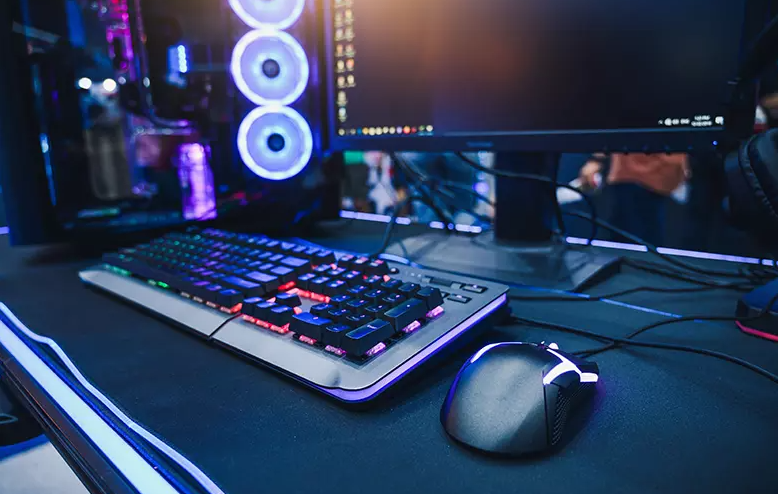With computer gaming more popular than ever, many gamers are asking: how do I optimize my PC for gaming? A sluggish computer can ruin your experience, whether you’re on Windows 11 or an older system. No one likes lag or delays, especially during intense gameplay. Maybe your PC is aging, or perhaps you haven’t cleared out old files or unused apps in a while.
Whatever the cause, there are simple fixes to boost your PC for gaming and get it running smoothly again. Next time you’re frustrated with slow performance, try these effective tips to learn how to make games run faster on PC and enhance your gaming setup!

Why Is My Computer So Slow?
A slow PC turns even basic tasks into a chore, and during gameplay, it’s downright maddening. You might blame your internet or Wi-Fi, especially if you’re often online. Slow connections can affect web pages, apps, or online games, but if you’re playing offline and still noticing lag, the issue might stem from one of these causes:
- An outdated operating system
- Low disk space (SSD or HDD)
- Out-of-date drivers
- Malware or viruses
- Insufficient RAM (Random Access Memory)
- Too many background programs
- Fragmented hard drive
- Startup programs you don’t need
- Visual effects draining resources
- Clutter from unused files or apps
The good news? You can tackle these problems to improve PC performance for gaming. Let’s explore how to optimize your PC for gaming with practical steps.
How Do I Optimize My Computer for Gaming?
You’d be amazed at how small tweaks can boost your PC for gaming. Did you know a simple restart can refresh your system and improve speed? Whether you’re running Windows 11, Windows 10, or an older version, these tips will help you make games run faster on your PC.
Free up Disk Space
Low disk space—whether on an SSD or HDD—can drag your PC down. Built-in tools can help, but here’s how to manually optimize your gaming PC:
- Delete files you no longer need.
- Move large media files (like videos or photos) to an external drive or cloud storage (Google Drive and iCloud offer free options, and Google Photos can even clear them from your device).
- Uninstall unused programs or software.
- If it’s still sluggish, try third-party PC optimization software to find and fix hidden slowdowns.
Defragment Your Hard Drive
Defragmenting your (older) hard drive can help to speed up your PC by reorganizing data to make it more accessible. As you use your computer more, the data on your hard drive becomes fragmented, making it difficult for your computer to find all the pieces of information that it needs to run something specific.
If you have Windows 7 or newer, your PC is most likely automatically defragmenting your computer weekly. If you are unsure or just want to do it manually, you can access the Start menu and then type defragment in the search bar. Choose the app that says Defragment and Optimize Drives.
Check for Updates
Want to know a simple trick for how to make your PC run faster? Keep it updated. An outdated OS or drivers can bottleneck performance.
- For Windows, open the Start menu, search “Update & Security,” and install any pending updates—Windows 11 in 2025 often includes gaming-specific optimizations.
- Drivers matter too; they tell your PC how to use devices like your GPU, keyboard, or mouse. Outdated graphics drivers, especially, can tank gaming performance. Visit your manufacturer’s site (e.g., NVIDIA, AMD) or use a driver update tool like iolo Updater.
Check For Malware or Viruses
Even cautious users can pick up malware that slows or damages their system. It’s a silent killer of gaming performance. Malware can take over your system by running applications in the background that hog your memory and slow your PC down.
- The easiest fix? Install trusted antivirus software to detect and remove threats.
- Regular system updates also patch security flaws, helping you stay ahead of malware risks.
Frequently Asked Questions
Should I overclock my CPU or GPU to improve gaming performance?
Overclocking can boost your PC for gaming by increasing the speed of your CPU or GPU beyond factory settings, potentially making games run faster. However, it requires proper cooling (like an aftermarket cooler) to avoid overheating and may void warranties. For beginners, tools like MSI Afterburner (for GPUs) or BIOS settings (for CPUs) can help, but proceed cautiously and research your hardware’s limits.
How does a gaming monitor affect my PC’s performance?
A gaming monitor doesn’t directly optimize your PC, but it impacts your experience. High refresh rates (e.g., 144Hz or 240Hz) and low response times (e.g., 1ms) make games feel smoother if your PC can output high FPS. If your PC struggles, a monitor with G-Sync or FreeSync can reduce stuttering. Match your monitor to your PC’s power for the best results.
Can upgrading my power supply (PSU) help with gaming performance?
A better PSU won’t directly speed up games, but an underpowered or old unit can cause instability (e.g., crashes, throttling) if it can’t support your GPU or CPU during demanding games. Check your hardware’s wattage needs (e.g., 650W+ for modern GPUs like NVIDIA RTX 40-series) and upgrade if necessary for reliability.
Does closing browser tabs improve gaming performance?
Closing unused browser tabs can free up RAM and CPU resources, especially if they’re running heavy sites or extensions. It won’t transform your gaming PC, but it can help if you’re multitasking while gaming. For a bigger boost, close resource-hogging apps entirely via Task Manager.
How do I optimize my PC for specific games like Fortnite or Cyberpunk 2077?
Check the game’s recommended settings (e.g., Fortnite needs a decent GPU like an NVIDIA GTX 1660, Cyberpunk 2077 prefers SSDs and 16GB RAM). Adjust in-game graphics (e.g., lower shadows or resolution) to match your PC’s power. Visit forums or the game’s site for tailored tweaks beyond general PC optimization.








